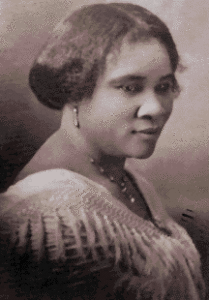
By Julianne Malveaux
NNPA News Wire Columnist
Women entrepreneurs have a powerful role model when they consider Madam C.J. Walker. One of our nation’s first female self-made millionaires, her story of combining herbs to develop and manufacture a hair pomade, of empowering tens of thousands of women as sales agents for her products, and of establishing a beauty school to teach beauty techniques (and provide economic empowerment for even more women) are the stuff of legend. She was not only an entrepreneur, but also a philanthropist. She “lived large,” owning two cars and a sprawling estate, Villa Lewaro in Irvington, New York, but she shared her wealth (Black millionaire Harold Doley purchased Villa Lewaro in 1993. It is a National Historic Landmark). She was possessed with an amazing self-confidence that served her well in business and in life.
Madam (as she is called by her great-granddaughter, A’Lelia Bundles, the keeper of the family history and author of books about her ancestor (On Her Own Ground: The Life and Times of Madam C. J. Walker), Madam C. J. Walker: Entrepreneur (Chelsea House, 1991; revised 2008), Madam Walker Theatre Center: An Indianapolis Treasure (Arcadia Publishing, 2013)), was a character! She changed her name from Sarah Breedlove to Madam C.J. Walker to provide herself with a “classier” sounding name, and to help prevent white people from calling her “Aunt”, as they called so many African American women. She didn’t want whites calling her the demeaning “Aunt” (to close to Mammy, for my thinking), nor did she want the patronizing attitudes of Black men to affect the way she went about her business. For years, she sought the opportunity to speak at Booker T. Washington’s National Business League, but was denied. As legend goes, she went to one of the meetings and took the mic and made her speech, despite official denial. Why should she not have spoken? She was one of the most successful business people of her generation. She was one of the most generous philanthropists. She financially sponsored the anti-lynching campaign. Perhaps Booker T. Washington was being a sexist, or perhaps (it is sometimes said) he had an ideological opposition to a woman whose product was perceived as straightening hair. By the way, Walker did not invent the straightening comb. Annie Malone, who preceded Madam Walker in making her fortune with beauty products and a beauty school that Walker attended, invented the straightening comb.
Whether Washington wanted Madam Walker to speak, she had the audacity to take the mic and say her piece. She noted that she had promoted herself from a washerwoman to a businesswoman, speaking to the fact that few were available to help her to achieve her goals and the goals of tens of thousands of other women. Her audacity, her self-possession, her activism were notable during a time when few women, regardless of race, promoted themselves, instead choosing to walk softly and speak quietly. Today, women like Cathy Liggons Hughes (TV/Radio One), Sheila Johnson (co-founder of BET), and Oprah Winfrey stand on her shoulders.
And today, in time for Women’s History Month, Madam C.J. Walker’s products are making a comeback. Her historic formulas have been modified for contemporary use, with four formulas made available based on hair texture. A’lelia Bundles has been supportive of the line which, as of March 4, is exclusively available at the Sephora cosmetics stores. I’ve not tried the products yet, but I can’t wait to shampoo my hair with a little bit of history, with a product that derives from the formulas of Madam C.J. Walker.
The Madam C.J. Walker story takes on a special significance in these economic times. You may have heard that there has been an economic recovery, but if you are like most people in these United States, you haven’t felt it. Incomes have hardly risen since 2009, when our current President took office. Not his fault – but that’s not the point. The point is that too many people are hurting, and some of the pain is joblessness.
Barriers to employment entry are high, especially for some young African Americans who, despite similar qualifications to their White counterparts, take much longer to find meaningful and remunerative work. If the labor market won’t absorb these young people, African American entrepreneurs, the inheritors of Madam C.J. Walker, must. Where is the business leader who can create tens of thousands of sales agents and provide entrepreneurship opportunities for so many?
African American women are increasingly likely to take up the mantle of Madam C.J. Walker and start businesses. Younger women, especially, are motivated by job markets that they perceive to be unwelcoming. While our colleges teach some educational fundamentals, they ought also be encouraged to teach entrepreneurship. If job market continues to generate an official Black unemployment rate of around ten percent, and an employment population ratio of sixty percent (which means that just 60 percent of the adult population is working – it is closer to 70 percent for whites, then the need for black entrepreneurs is critical. In the name of Madam C.J. Walker, let’s keep our entrepreneurial gene thriving!
Julianne Malveaux is an author and economist based in Washington, DC. Her latest book, Are We Better Off? Race, Obama and Public Policy can be purchased at www.juliannemalveaux.com
PHOTO CAPTION: Julianne Malveaux says that African American women are increasingly likely to take up the mantle of Madam C.J. Walker and start businesses.




